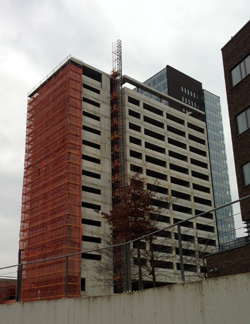
ČKAIT: Buildings are of lower quality due to pressure for low prices
 |
"The mess currently prevailing in Czech construction forces construction firms to work for 40 to 60 percent of the normal price. But then they have a problem staying within that budget, so they look for every possible way to save. They choose the cheapest materials and install whatever they can into the buildings," claims Vaverka.
According to him, contractors cannot be relied upon too much because their only criterion is supposedly the lowest price. "They have contracted poor prices, and somewhere that has to reflect. The problem also lies with some developers who sell the construction and do not care at all that it is of poor quality," criticizes Vaverka the increasingly common practices in the Czech market.
That the Czech market has recently been flooded with low-quality construction materials due to relentless cost-cutting is confirmed, for example, by Radek Bedrna, managing director of Knauf Praha, a manufacturer of drywall building materials. "The problem is the immense pressure on prices, which construction companies have to adapt to by severely cutting quality. For example, they use materials that are not suitable for that specific construction. We are increasingly encountering imported cheap uncertified products from abroad, mainly from Poland," says Bedrna, who claims that up to half of the constructions are compromised.
The Association of Property Inspectors (AIN) also pointed out the declining quality of buildings this year, as its members uncovered numerous defects during inspections of the technical condition of new family homes last year, the remediation of which would cost around one hundred million crowns. And this was only after inspecting 700 residential buildings, which constitutes a mere one percent of all houses intended for sale.
Builders also admit a greater willingness to cut quality. In a recent survey by the analytical company CEEC Research, 59 percent of construction firms stated that they are constructing buildings on the verge of quality. "Many directors of construction firms confirm that the current crisis in the market, manifested by a lack of contracts and investors' efforts to achieve the lowest possible prices, in some cases forces them to reduce the quality of construction work," commented CEEC Research director Jiří Vacek on the survey results.
However, Vaverka warns that quality cannot be lowered indefinitely. "There are two types of risks - direct and indirect. Direct means that the construction collapses outright, or for example, gas starts to leak through damaged pipes. By indirect risk, I mean that the lifespan of such poorly constructed buildings may drop to half, walls crack more often, structures warp, and so on," Vaverka described possible risks.
The head of the Czech building materials manufacturer Bedrna emphasized that the situation has now crossed the line of acceptability. "It's a huge gamble. Over the years, it has become so prevalent that we see tremendous danger in it," Bedrna does not hide his concerns.
According to experts, the situation would improve if the construction and technical supervision of the buildings was enhanced. More thorough quality control of materials and construction work is also needed.
The English translation is powered by AI tool. Switch to Czech to view the original text source.
0 comments
add comment
Related articles
0
25.09.2018 | Builders: The prices of building materials will increase by five to ten percent
0
15.03.2017 | ČKAIT wants a methodology that would reduce the number of low-quality constructions
0
20.02.2016 | <div>Design firms are operating at 94% capacity, the highest since 2011.</div>
0
26.09.2015 | The state has accelerated the preparation of constructions this year, there are more tenders for projects
0
15.09.2015 | Construction designers expect a 7.3 percent increase in contracts
4
26.08.2015 | The builders are complaining about the low quality of the project documentation
0
26.05.2015 | Construction designers have more work from the state administration this year
0
11.05.2015 | One third of design companies already have more work than last year
0
10.03.2015 | Designer work will not be competed for the lowest price
0
08.12.2014 | Architects and engineers criticize awarding contracts based solely on price
0
15.11.2014 | <html>Design firms perceive a revival; some will be hiring people.</html>
0
04.11.2014 | The price of project work in tenders has dropped on average by a quarter
0
16.09.2014 | Work for designers will increase this year, according to a survey
0
09.09.2014 | <p>Building designers complain about low prices for contracts and bureaucracy.</p>
0
20.08.2014 | Final prices of construction contracts are one fifth lower than planned
2
04.03.2014 | Quality of buildings is significantly declining, construction companies admit
0
04.09.2013 | <Project firms do not have money for operations, half are looking for an investor>
0
31.12.2012 | <div>Kommora architektů considers this year a breakthrough for architecture.</div>
2
04.09.2012 | Designers anticipate a decline in the industry, fearing further pressure on prices
0
13.04.2010 | <translation>Chamber of Engineers recommends the government to introduce a price list for construction work</translation>












